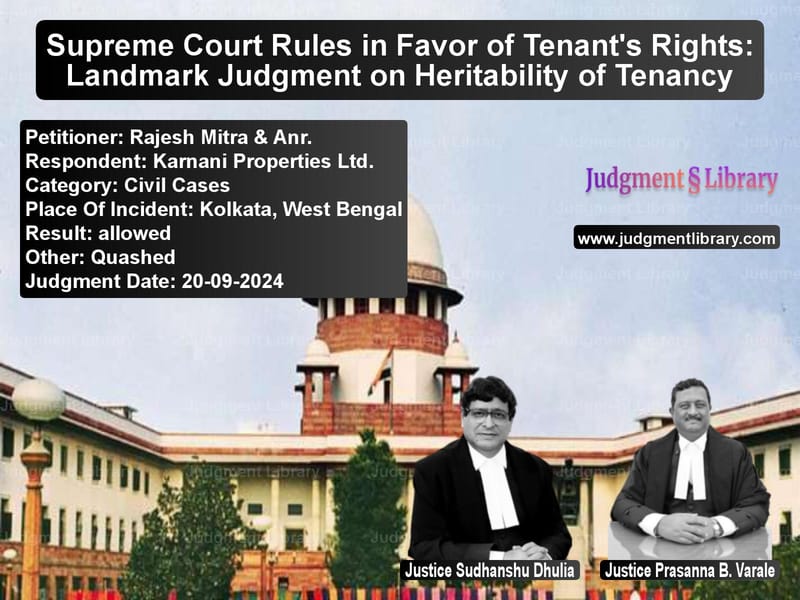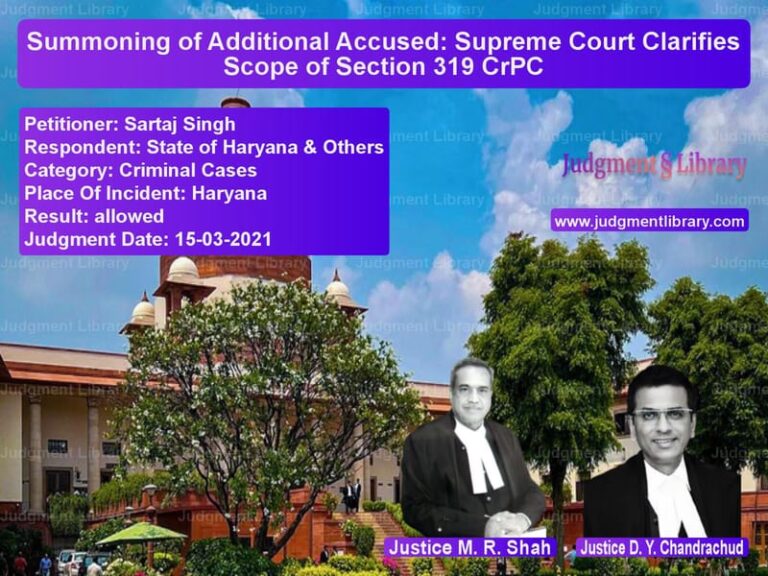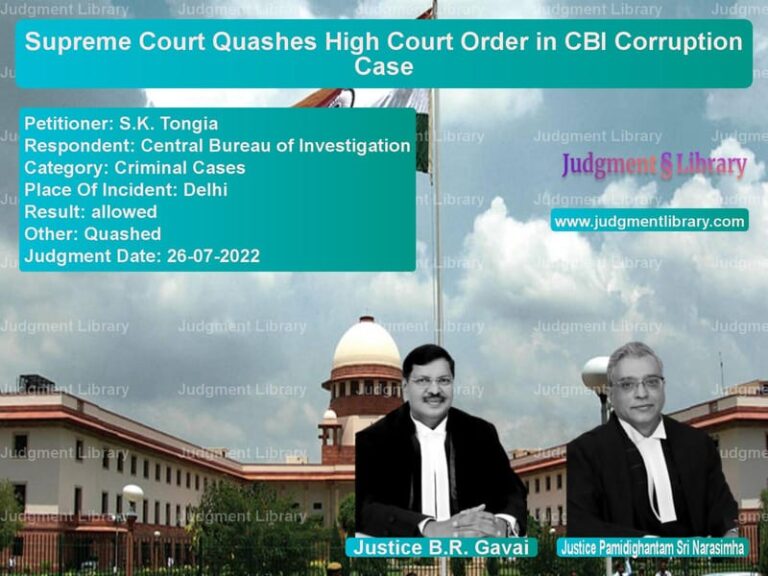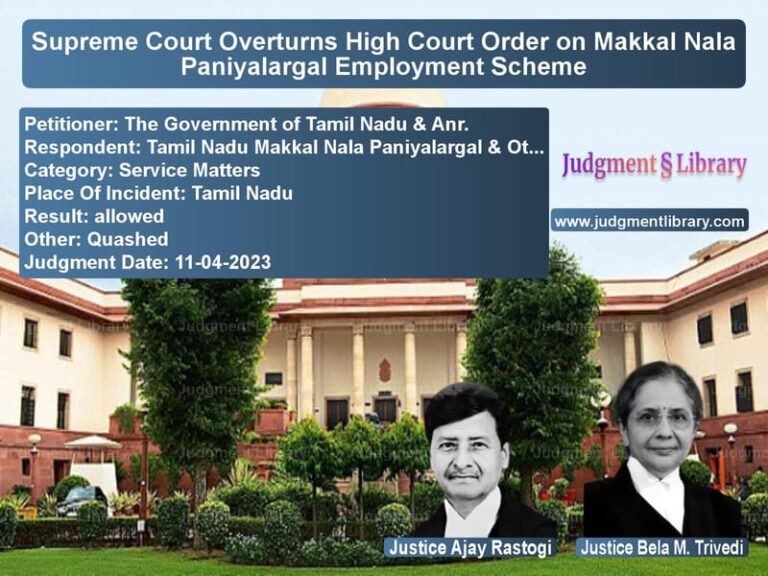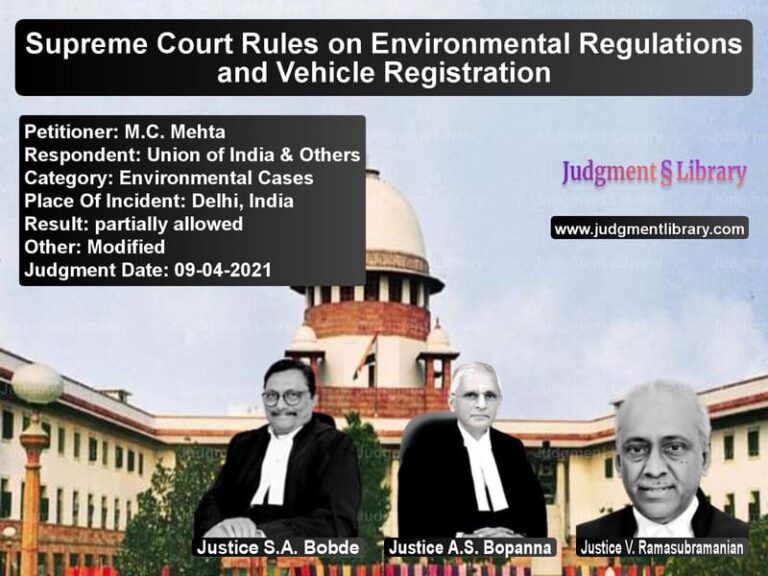Supreme Court Rules in Favor of Tenant’s Rights: Landmark Judgment on Heritability of Tenancy
The case of Rajesh Mitra & Anr. vs. Karnani Properties Ltd. is a significant ruling on the issue of tenant rights and heritability under the West Bengal Premises Tenancy Act, 1956, and its subsequent amendment under the West Bengal Premises Tenancy Act, 1997. The Supreme Court overturned the eviction orders of the High Court, reaffirming that legal heirs of a tenant cannot be arbitrarily deprived of their tenancy rights by retrospective application of a new law.
The ruling clarifies the interpretation of tenancy laws and protects tenants from being unfairly evicted based on ambiguous legislative provisions.
Background of the Case
The appellants, Rajesh Mitra and another, were the legal heirs of S.K. Mitra, the original tenant of Room No. 208 at 25-A, Park Street, Kolkata. The premises were originally rented to S.K. Mitra, and upon his death in 1970, his widow Usha Mitra and his children continued to occupy the property.
The respondent, Karnani Properties Ltd., filed an eviction suit arguing that:
- Upon the death of Usha Mitra in 2009, the tenancy could only continue for five years as per the amended definition of ‘tenant’ under the West Bengal Premises Tenancy Act, 1997.
- The tenancy legally ended in 2014, and the appellants were unauthorized occupants.
- The appellants had admitted in another case that their mother was the sole tenant, and therefore, their right to tenancy expired in 2014.
Legal Arguments
Arguments by the Appellants (Tenants – Rajesh Mitra & Anr.)
- The tenancy was inherited by them under the 1956 Act, which allowed legal heirs to continue tenancy without any time restriction.
- The 1997 Act could not be applied retrospectively to extinguish their rights, as their tenancy vested before the law came into effect.
- The alleged “admission” relied upon by the respondent was taken out of context and did not constitute an unequivocal surrender of tenancy rights.
- The eviction order was based on an incorrect interpretation of the law and violated the principle of non-retrospective application of laws.
Arguments by the Respondent (Landlord – Karnani Properties Ltd.)
- The 1997 Act limited the inheritance of tenancy to five years from the death of the original tenant.
- Since Usha Mitra passed away in 2009, the tenancy legally ended in 2014.
- The appellants had admitted in a separate case that their mother was the sole tenant, and hence, they had no independent tenancy rights.
- The eviction orders issued by the High Court were valid under the amended tenancy law.
Supreme Court’s Observations
The Supreme Court examined the validity of applying the 1997 Act retrospectively and the legal principles governing tenancy succession.
1. Can the 1997 Act Be Applied Retrospectively?
The Court ruled that tenancy rights vested under the 1956 Act could not be extinguished by the 1997 Act. The Court observed:
“The enforcement of a new statute does not automatically extinguish rights accrued under the previous statute unless there is an explicit legislative intent.”
The Court held that there was no clear indication in the 1997 Act that it intended to apply retrospectively.
2. Was the Alleged Admission a Valid Ground for Eviction?
The Court examined the appellant’s alleged admission and ruled that it was not a clear, unambiguous acknowledgment of surrendering tenancy rights.
“A statement made in a separate legal proceeding, when taken out of context, cannot be construed as an admission under Order XII Rule 6 of the CPC.”
3. Interpretation of ‘Tenant’ Under the 1997 Act
The Court analyzed the definition of ‘tenant’ under the 1997 Act, which states that tenancy rights of heirs last for five years after the death of the original tenant or from the commencement of the Act, whichever is later.
However, the Court ruled that this provision could not override rights vested under the 1956 Act before the 1997 amendment.
Final Verdict
The Supreme Court overturned the eviction orders and ruled:
- The tenancy rights of the appellants remained intact as they had inherited them under the 1956 Act.
- The 1997 Act did not have retrospective effect and could not extinguish vested tenancy rights.
- The eviction order based on an alleged admission was legally flawed.
- The appellants cannot be evicted on the basis of the erroneous application of the 1997 Act.
This ruling is a significant reaffirmation of tenant rights and prevents retrospective application of laws to dispossess long-standing tenants.
Petitioner Name: Rajesh Mitra & Anr..Respondent Name: Karnani Properties Ltd..Judgment By: Justice Sudhanshu Dhulia, Justice Prasanna B. Varale.Place Of Incident: Kolkata, West Bengal.Judgment Date: 20-09-2024.
Don’t miss out on the full details! Download the complete judgment in PDF format below and gain valuable insights instantly!
Download Judgment: rajesh-mitra-&-anr.-vs-karnani-properties-l-supreme-court-of-india-judgment-dated-20-09-2024.pdf
Directly Download Judgment: Directly download this Judgment
See all petitions in Landlord-Tenant Disputes
See all petitions in Property Disputes
See all petitions in Contract Disputes
See all petitions in Judgment by Sudhanshu Dhulia
See all petitions in Judgment by Prasanna Bhalachandra Varale
See all petitions in allowed
See all petitions in Quashed
See all petitions in supreme court of India judgments September 2024
See all petitions in 2024 judgments
See all posts in Civil Cases Category
See all allowed petitions in Civil Cases Category
See all Dismissed petitions in Civil Cases Category
See all partially allowed petitions in Civil Cases Category

